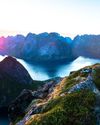
The water is cold inside Norway's northernmost fjords. When I slipped in headfirst, wearing a thick wetsuit, the four degrees-Celsius surface temperature made the water feel dense and biting on my exposed face. Diving down, I crossed a threshold into another world-dark, frigid, seemingly bottomless, and home to giant carnivores that eat fish, seals, and porpoises.
If you want to see wild orcas, they can be found in every ocean, from the Arctic to Antarctic. The coast of Canada's British Columbia, Argentina's Valdes Peninsula, and Australia's Bremer Bay are all popular orca-watching spots.
Despite their "killer whale" nickname, orcas don't prey on humans. But they are the largest dolphins on the planet, with seven main ecotypes that vary in pigmentation pattern, diet, and sonar dialect. Members of these groups don't usually mate with one another, though scientists are divided on whether to consider them different species.
Most countries set limits on how close you can get to orcas. That's not the case in Norway, which has no laws against swimming with dolphins and whales (the country's whaling laws are also notoriously lax).
This makes Norway an alluring destination for orca lovers, but it can also lead to danger for both humans and animals. At one point during my visit, I saw three young tourists from Spain block a pod of orcas with their sailboat, jump into the water, and try to approach by paddleboard. Their tactics scared the orcas into hiding far below the surface. What's more, the tourists could have ended up stranded out there beyond the fjords, three miles from the nearest shoreline, left to the mercy of the fierce Arctic weather and currents.
Diese Geschichte stammt aus der October 2022-Ausgabe von Reader's Digest UK.
Starten Sie Ihre 7-tägige kostenlose Testversion von Magzter GOLD, um auf Tausende kuratierte Premium-Storys sowie über 8.000 Zeitschriften und Zeitungen zuzugreifen.
Bereits Abonnent ? Anmelden
Diese Geschichte stammt aus der October 2022-Ausgabe von Reader's Digest UK.
Starten Sie Ihre 7-tägige kostenlose Testversion von Magzter GOLD, um auf Tausende kuratierte Premium-Storys sowie über 8.000 Zeitschriften und Zeitungen zuzugreifen.
Bereits Abonnent? Anmelden

EVERY SECOND COUNTS: TIPS TO WIN THE RACE AGAINST TIME
Do you want to save 1.5 seconds every day of your life? According to the dishwasher expert at the consumer organisation Choice, there’s no need to insert the dishwashing tablet into the compartment inside the door.

May Fiction
An escaped slave's perspective renews Huckleberry Finn and the seconds tick down to nuclear Armageddon in Miriam Sallon’s top literary picks this month

Wine Not
In a time of warning studies about alcohol consumption, Paola Westbeek looks at non-alcoholic wines, how they taste and if they pair with food

Train Booking Hacks
With the cost of train travel seemingly always rising, Andy Webb gives some tips to save on ticket prices

JOURNEY TO SALTEN, NORWAY, UNDER THE MIDNIGHT SUN
Here, far from the crowds, in opal clarity, from May to September, the sun knows no rest. As soon as it’s about to set, it rises again

My Britain: Cheltenham
A YEAR IN CHELTENHAM sees a jazz festival, a science festival, a classical music festival and a literature festival. Few towns with 120,000 residents can boast such a huge cultural output!

GET A GREEN(ER) THUMB
Whether you love digging in the dirt, planting seeds and reaping the bounty that bursts forth, or find the whole idea of gardening intimidating, this spring offers the promise of a fresh start.

Under The GRANDFLUENCE Suzi Grant
After working in TV and radio as an author and nutritionist, Suzi Grant started a blog alternativeageing.net) and an Instagram account alternativeageing). She talks to Ian Chaddock about positive ageing”

Sam Quek: If I Ruled The World
Sam Quek MBE is an Olympic gold medalwinning hockey player, team captain on A Question of Sport and host of podcast series Amazing Starts Here

Stand Tall, Ladies
Shorter men may be having their moment, but where are the tall women?